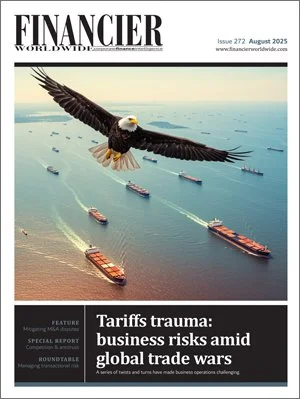Unsolicited: ‘bear hugs’ in M&A
August 2025 | FEATURE | MERGERS & ACQUISITIONS
Financier Worldwide Magazine
While the majority of M&A transactions involve friendly interactions between parties, others may be pursued with a fair degree of hostility. One such method, known as a ‘bear hug’, is defined by the Corporate Finance Institute (CFI), as a hostile takeover strategy where a potential acquirer offers to purchase the stock of another company for a much higher price than what the target is actually worth.
“A ‘bear hug’ is a fairly common tactic by bidders pursuing hostile takeover strategies,” explains Alon Kapen, a partner at Farrell Fritz. “If a bidder does not have the support of the target board or does not feel it is worth pursuing, the next or first step is very often a bear hug letter.
“Such a letter will typically state how disappointed the bidder is that the company has chosen not to meet and has decided the only way to proceed is to make a public proposal,” he continues. “The letter then states the purchase price the bidder is proposing to acquire the company for and the premium it represents, and proposes the two sides commence negotiations.”
Accept or reject
In its analysis, the CFI puts forward key reasons as to why companies prefer using a bear hug takeover strategy rather than other forms.
One reason is to limit competition. When there is public information that a company is looking to be acquired, there are likely to be multiple interested buyers. The potential buyers will aim to secure the acquisition of the target company but, of course, at the best possible price – a price that is well above the fair market price. This discourages other bidders from attempting to pursue the takeover, thereby clearing the field for the bear hug acquirer.
Another reason is to avoid confrontation with the target company. Companies attempt a hostile takeover because the management of the target company is reluctant to accept an offer to acquire their company. The alternative is to approach the shareholders directly to get their approval, or fighting to replace the management or board of directors of the company.
“Current economic uncertainty is resulting in a subdued market. However, as conditions improve, a range of factors is likely to influence future deployment of the strategy.”
“From a buyer’s perspective, the advantages of a bear hug strategy is the likelihood of acceptance due to a big premium, the incentive for stockholders to pressure the company, discouragement of competition from rival bidders and a quicker deal process,” points out Mr Kapen. “From the company’s standpoint, the strategy could be good for stockholders in the form of the premium on their shares, which will attract attention from other strategic buyers, as well as better management, if the company was underperforming.”
Conversely, the management of the target company may reject the ‘bear hug’ if it genuinely believes the deal is not in the best interests of the company’s shareholders. However, as noted by the CIF, unless a rejection of the offer is truly justifiable, two potential problems may arise.
First, if the target company management rejects the offer, the acquirer may approach the shareholders directly with a tender offer to purchase shares of the company at an above-market price. The acquirer offers to buy shares from every shareholder of the company at a price that gives them a sizeable profit.
Second, if management cannot justify its decision to reject such a generous offer (the board of directors has a fiduciary responsibility to serve the best interests of stockholders), shareholders can file a lawsuit against management.
“Additional issues for the bidder and target company to consider include, for the bidder, a higher cost in the form of the premium, the risk of drawing attention from regulators and the risk of driving the overall price higher,” asserts Mr Kapen. “For the company, there is the risk of losing control to the bidder, risk of a bad deal resulting from stockholder pressure and litigation risk if the board resists.”
Return to bear hugs
Although M&A deal activity is expected to pick up later in the year, current economic uncertainty is resulting in a subdued market. However, as conditions improve, a range of factors is likely to influence future deployment of the strategy.
“One factor is the stock market,” says Mr Kapen. “If the market is unstable, bidders may be nervous about offering premiums. If the market is depressed, they are more likely to offer premiums because the ‘premium’ would be relative to depressed price levels. Interest rates will also be a factor, as higher rates make deals more expensive, likely discouraging bear hugs.
“Right now, however, no one is doing deals, largely because of the uncertainty surrounding federal trade policy,” he concludes. “So, until acquirers get more confident about the direction of the economy, there will be fewer deals, including hostile bids, and thus fewer bear hugs.”
© Financier Worldwide
BY
Fraser Tennant


